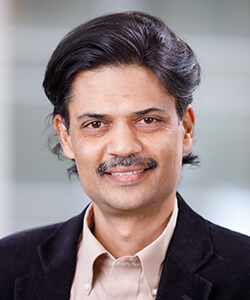April 5, 2021
Investigator Spotlight:
Channabasavaiah B. Gurumurthy BVSC (DVM), MVSC, PhD, MBA, University of Nebraska Medical Center
Research Interests:
I am a professor of Pharmacology and Experimental Neuroscience and director of the Mouse Genome Engineering Core Facility. My research interest is in enhancing technologies for biomedical research. I develop genome-editing technologies and custom mouse models useful to research ranging from cancer to neuroscience to COVID-19 research. I am fortunate to work in the interface of two Nobel awarded technologies: mouse genome engineering and the CRISPR-Cas systems. Along with a long term collaborator Prof. Masato Ohtsuka (Tokai University, Japan), I have published more than 25 papers on mouse genome engineering technologies, ultimately developing Easi-CRISPR—an approach now regarded as a revolutionary method in our field.
Easi-CRISPR is now adapted as the method of choice at hundreds of laboratories and has attracted dozens of collaborators from around the world to UNMC, who are interested in generating custom mouse models. Now, a few companies and research institutes are investigating our technical contributions for use as gene therapy platforms for cancer and some genetic diseases.
Educational background
- BVSC (DVM): Bangalore Veterinary College, Karnataka, India
- MVSC & PHD: Indian Veterinary Research Institute, Mukteswar, Uttarakhand, India
- Executive MBA: University of Nebraska at Omaha, NE, USA
Little-known facts about Dr. Gurumurthy
- I enjoy road trips. I have driven more than 1,000 miles in one day, and 23 hours – non-stop.
- I used to have a lot of stage fright. Because I was top in my class in high school, my language teacher selected me to represent my high school at a county-level debate, thinking I would win a medal. I stood on stage shivering and did not say a word. In just the last couple of years, I have given more than 75 seminars, keynote talks, and conducted workshops in ten countries.
About the Big Ten Cancer Research Consortium: The Big Ten Cancer Research Consortium was created in 2013 to transform the conduct of cancer research through collaborative, hypothesis-driven, highly translational oncology trials that leverage the scientific and clinical expertise of Big Ten universities. The goal of the Big Ten Cancer Research Consortium is to create a unique team-research culture to drive science rapidly from ideas to new approaches to cancer treatment. Within this innovative environment, today’s research leaders collaborate with and mentor the research leaders of tomorrow with the unified goal of improving the lives of all patients with cancer.
About the Big Ten Conference: The Big Ten Conference is an association of world-class universities whose member institutions share a common mission of research, graduate, professional and undergraduate teaching and public service. Founded in 1896, the Big Ten has sustained a comprehensive set of shared practices and policies that enforce the priority of academics in the lives of students competing in intercollegiate athletics and emphasize the values of integrity, fairness and competitiveness. The broad-based programs of the 14 Big Ten institutions will provide over $200 million in direct financial support to almost 9,500 students for more than 11,000 participation opportunities on 350 teams in 42 different sports. The Big Ten sponsors 28 official conference sports, 14 for men and 14 for women, including the addition of men’s ice hockey and men’s and women’s lacrosse since 2013. For more information, visit www.bigten.org.















Subscribe to the Big Ten CRC Newsletter X
X Facebook
Facebook YouTube
YouTube